Natural clay frameworks in membrane electrode assembly: Challenges and perspectives
IF 17.1
1区 材料科学
Q1 CHEMISTRY, PHYSICAL
引用次数: 0
Abstract
As a key component of polymer electrolyte membrane fuel cells, membrane electrode assemblies (MEAs) directly influence the performance of the fuel cell. In recent years, due to the unique pore and layered nanostructures as well as active sites of natural clay framework materials, which provide a large specific surface area and surface effects, along with introducing abundant organic functional groups on their surfaces and interlayers, the development of natural clay composite MEAs has become an important approach to enhancing the mechanical properties, electrochemical performance, and methanol resistance as well as reducing costs. Although there are many related studies, there is still a lack of comprehensive reviews. This paper provides a comprehensive review from various nanoscale perspectives on the structures and properties of different types of clay framework materials and their research progress in application to MEAs in both proton exchange membrane fuel cells (PEMFCs) and direct methanol fuel cells (DMFCs). The review summarizes current research on natural clay framework material composite MEAs and provides perspectives for future directions.

膜电极组装中的天然粘土框架:挑战与前景
膜电极组件作为聚合物电解质膜燃料电池的关键部件,直接影响燃料电池的性能。近年来,由于天然粘土框架材料具有独特的孔隙和层状纳米结构以及活性位点,提供了较大的比表面积和表面效应,并且在其表面和中间层上引入了丰富的有机官能团,因此开发天然粘土复合MEAs已成为提高其力学性能、电化学性能、抗甲醇性能和降低成本的重要途径。虽然相关研究较多,但仍缺乏全面的综述。本文从多个纳米尺度的角度综述了不同类型粘土框架材料的结构和性能,以及它们在质子交换膜燃料电池(pemfc)和直接甲醇燃料电池(dmfc)中应用于MEAs的研究进展。综述了天然粘土框架材料复合mea的研究现状,并对未来的研究方向进行了展望。
本文章由计算机程序翻译,如有差异,请以英文原文为准。
求助全文
约1分钟内获得全文
求助全文
来源期刊

Nano Energy
CHEMISTRY, PHYSICAL-NANOSCIENCE & NANOTECHNOLOGY
CiteScore
30.30
自引率
7.40%
发文量
1207
审稿时长
23 days
期刊介绍:
Nano Energy is a multidisciplinary, rapid-publication forum of original peer-reviewed contributions on the science and engineering of nanomaterials and nanodevices used in all forms of energy harvesting, conversion, storage, utilization and policy. Through its mixture of articles, reviews, communications, research news, and information on key developments, Nano Energy provides a comprehensive coverage of this exciting and dynamic field which joins nanoscience and nanotechnology with energy science. The journal is relevant to all those who are interested in nanomaterials solutions to the energy problem.
Nano Energy publishes original experimental and theoretical research on all aspects of energy-related research which utilizes nanomaterials and nanotechnology. Manuscripts of four types are considered: review articles which inform readers of the latest research and advances in energy science; rapid communications which feature exciting research breakthroughs in the field; full-length articles which report comprehensive research developments; and news and opinions which comment on topical issues or express views on the developments in related fields.
 求助内容:
求助内容: 应助结果提醒方式:
应助结果提醒方式:


